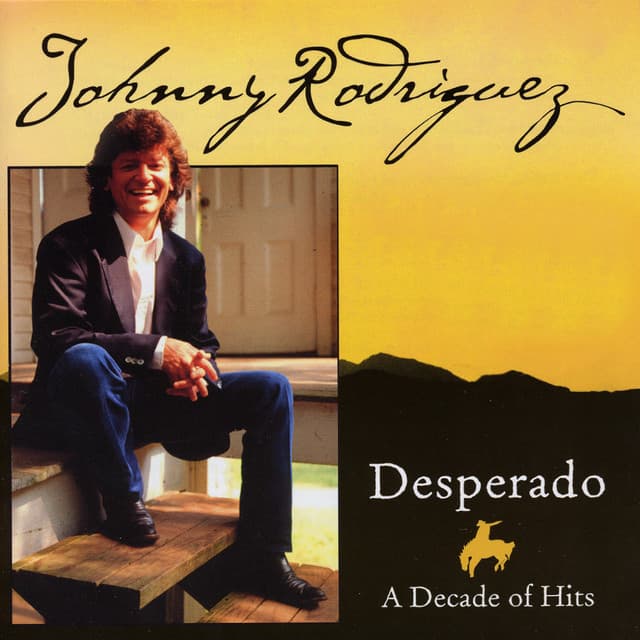
The Lonesome Outlaw: A Country Crooner’s Poignant Reflection on a Life Unsuited for Lasting Love
Johnny Rodriguez‘s tender and profoundly melancholic interpretation of “Desperado” was a daring yet ultimately successful venture for the country star, showcasing his remarkable ability to infuse pop-rock classics with authentic country soul. His version of this iconic song soared to number 5 on the Billboard Hot Country Singles chart in 1977, a testament to his undeniable appeal and his unique vocal style that effortlessly blended traditional country with a touch of Latin warmth. Featured on his 1976 album, “Reflecting” (which peaked at number 11 on the Billboard Top Country Albums chart), Rodriguez‘s “Desperado” became a cherished track, beloved by fans who appreciated his sensitive take on a narrative of loneliness and regret. It further solidified Rodriguez‘s reputation as a versatile and empathetic balladeer, appealing to millions who understood the poignant ache of a life lived on the fringes, forever yearning for a connection it can’t quite grasp.
The story behind “Desperado” is intrinsically linked to its original creators, Glenn Frey and Don Henley of The Eagles. Released on their seminal 1973 album of the same name, the song quickly became one of their most beloved and critically acclaimed pieces, though it was not a major single for them. Henley often cited it as one of his proudest compositions. The song’s narrative is a metaphorical tale of a lone outlaw, a “desperado,” who is so consumed by his solitary, wild ways that he is unable to open his heart to love, even when it’s offered. It’s a poignant exploration of the consequences of emotional closure and the pain of self-imposed isolation. Years later, Johnny Rodriguez, always possessing a keen ear for powerful narratives that resonated with the country ethos of heartbreak and introspection, chose to cover this profound rock ballad. His decision transformed the song’s context, grounding its universal themes of loneliness and the inability to commit within the familiar soundscape of country music. Rodriguez‘s version brought a fresh perspective, highlighting the raw vulnerability and inherent sadness of the “desperado” character, making it accessible to a different audience while honoring the original’s emotional core.
The meaning of “Desperado” is a poignant and deeply introspective exploration of a lone individual, often depicted as a metaphorical outlaw, who is emotionally closed off and unable to embrace love or lasting connection, despite the yearning for it. It’s a song about self-imposed isolation, the fear of vulnerability, and the bittersweet realization of a life lived on the fringes, perpetually alone. The lyrics convey a tender plea from an observer to this “desperado,” urging them to break free from their solitary ways and allow love to enter their life before it’s too late. Lines like “Desperado, why don’t you come to your senses? / You been out ridin’ fences for so long now” perfectly capture this gentle admonition and heartfelt concern. It speaks to the universal human experience of confronting one’s emotional defenses, the courage required to open up to another, and the profound regret that can come from a life lived in fear of true intimacy, leaving behind a legacy of loneliness despite an outward appearance of rugged independence.
Johnny Rodriguez‘s vocal performance on “Desperado” is a masterful blend of his smooth country croon and a palpable sense of yearning. His voice, warm and imbued with a gentle melancholy, delivers the lyrics with a tender empathy that makes the listener feel the “desperado’s” inner conflict and profound loneliness. He sings with a quiet dignity, allowing the powerful narrative and its introspective themes to take center stage. The instrumentation, characteristic of his mid-1970s Mercury recordings, is a refined take on the Nashville Sound: subtle steel guitar accents, a soft piano melody, and a gentle rhythm section create a wistful, contemplative atmosphere. This elegant yet understated production allows Rodriguez‘s expressive voice to shine, making his interpretation uniquely his own, standing apart from The Eagles‘ rock-infused original. It demonstrated his remarkable versatility and his ability to interpret songs that transcended genre boundaries, bringing a sensitive, country-tinged nuance to a universal tale of a restless heart.
Listening to “Desperado” today, particularly Johnny Rodriguez‘s deeply felt version, evokes a particular kind of profound nostalgia, transporting us back to a time when country music embraced emotional depth and lyrical sophistication. It reminds us of Rodriguez‘s unique gift for embodying vulnerability and conveying it with a quiet power that resonates deeply. For those of us who recall its pervasive charm on the airwaves, this song remains a cherished gem, a timeless anthem for the lonely heart and the profound regret of a life lived too long on the outside. It’s a melody that, even after all these years, continues to resonate with its poignant truth, gently reminding us that sometimes, even the most independent spirits yearn for connection, and the “desperado” inside us all longs to come in from the cold.